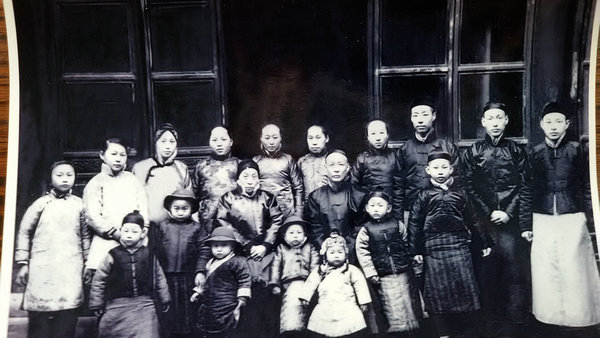The man who gave us Gongbao chicken
By Chen Lin ( China Daily ) Updated: 2016-06-18 11:32:16
 |
|
Ding Suzhen (center left), Ding Baozhen's daughter and her whole family. The photo was taken in Yangzhou, Jiangsu province in 1918. [Photo provided to China Daily] |
2 Formulation of policies and worked on ideas about reform and opening up: In the latter half of the 19th century, there were some bureaucrats who were advocating the so-called Westernization movement to introduce capitalist production methods in order to preserve the rule of the Qing Dynasty.
They relied on a small number of Western technocrats and tried to copy modern technology from the West.
But Ding advocated the training of talented young people, so they could learn modern scientific techniques and gain knowledge from the West while promoting the country's own productive power.
One of Ding's accomplishments was the taming of the Yellow River in Shandong province, and later-when he was governor of Sichuan province-the reconstruction of the Dujiangyan irrigation system in Chengdu.
This system is now seen as one of the most scientific and important irrigation systems in the world.
As the Qing government did not allocate sufficient funds for the taming of the Yellow River, Ding used his own already scanty savings and his wife's jewelry to fund the project and also persuaded local squires to make contributions.
In Chengdu, Ding exerted great efforts to complete the Dujiangyan irrigation project started by the Li Brothers over 2,200 years ago and made the Chengdu plain a "rich and prosperous land of fish and rice".
Almost every day during the construction period Ding would appear at the site and stand on the bank of the river to direct the work even at the risk of being swept away by the torrents.
After Ding's death, the local people built a temple at the site to remember him.
The temple was destroyed in the 2006 earthquake but a life-size statue of him was erected there after that.
|
|
|
|
|
|
|
|

























 Raymond Zhou:
Raymond Zhou: Pauline D Loh:
Pauline D Loh: Hot Pot
Hot Pot Eco China
Eco China China Dream
China Dream China Face
China Face






